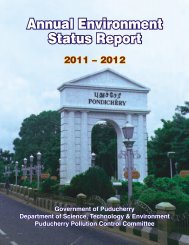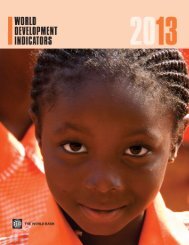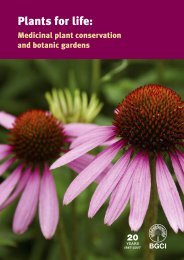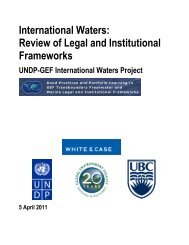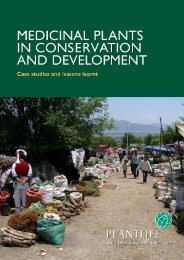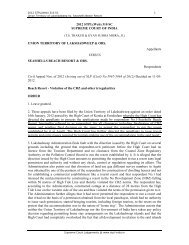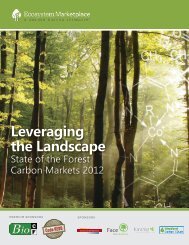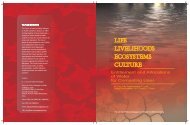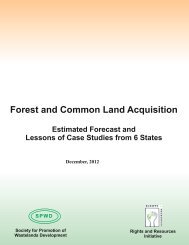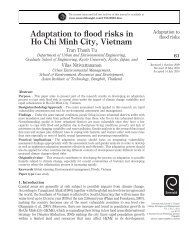- Page 1 and 2:
DEFORESTATION AROUND THE WORLD Edit
- Page 5 and 6:
Contents Preface IX Part 1 Deforest
- Page 9 and 10:
Preface Forests are giant reservoir
- Page 11:
Preface XI thankful to Maja Bozicev
- Page 15:
Part 1 Deforestation Impacts
- Page 18 and 19:
4 Deforestation Around the World in
- Page 20 and 21:
6 Deforestation Around the World Th
- Page 22 and 23:
8 Deforestation Around the World In
- Page 24 and 25:
10 Deforestation Around the World 4
- Page 26 and 27:
12 Deforestation Around the World T
- Page 28 and 29:
14 Deforestation Around the World F
- Page 30 and 31:
16 Deforestation Around the World F
- Page 32 and 33:
18 Deforestation Around the World a
- Page 34 and 35:
20 Deforestation Around the World S
- Page 36 and 37:
22 Deforestation Around the World D
- Page 38 and 39:
24 Deforestation Around the World 2
- Page 40 and 41:
26 Deforestation Around the World v
- Page 42 and 43:
28 Deforestation Around the World A
- Page 44 and 45:
30 Deforestation Around the World F
- Page 46 and 47:
32 Deforestation Around the World I
- Page 48 and 49:
34 Deforestation Around the World Z
- Page 50 and 51:
36 Deforestation Around the World W
- Page 52 and 53:
38 Deforestation Around the World c
- Page 54 and 55:
40 Deforestation Around the World O
- Page 56 and 57:
42 Deforestation Around the World O
- Page 58 and 59:
44 Deforestation Around the World n
- Page 60 and 61:
46 Deforestation Around the World D
- Page 62 and 63:
48 Deforestation Around the World M
- Page 64 and 65:
50 Deforestation Around the World t
- Page 66 and 67:
52 Deforestation Around the World 1
- Page 68 and 69:
54 S.N. Reference 1 2 3 4 5 6 Otter
- Page 70 and 71:
56 Deforestation Around the World O
- Page 72 and 73:
58 Deforestation Around the World t
- Page 74 and 75:
60 7. Model results Deforestation A
- Page 76 and 77:
62 Deforestation Around the World F
- Page 78 and 79:
64 Deforestation Around the World F
- Page 80 and 81:
66 Deforestation Around the World c
- Page 82 and 83:
68 Deforestation Around the World B
- Page 84 and 85:
70 Deforestation Around the World L
- Page 86 and 87:
72 Deforestation Around the World W
- Page 88 and 89:
74 Deforestation Around the World G
- Page 90 and 91:
76 Deforestation Around the World I
- Page 92 and 93:
78 Deforestation Around the World s
- Page 94 and 95:
80 Deforestation Around the World o
- Page 96 and 97:
82 Deforestation Around the World w
- Page 98 and 99:
84 Deforestation Around the World S
- Page 100 and 101:
86 Deforestation Around the World s
- Page 102 and 103:
88 Deforestation Around the World F
- Page 104 and 105:
90 Deforestation Around the World P
- Page 106 and 107:
92 5. Conclusions Deforestation Aro
- Page 108 and 109:
94 Deforestation Around the World P
- Page 110 and 111:
96 Deforestation Around the World f
- Page 112 and 113:
98 Deforestation Around the World g
- Page 114 and 115:
100 Deforestation Around the World
- Page 116 and 117:
102 Deforestation Around the World
- Page 118 and 119:
104 Deforestation Around the World
- Page 120 and 121:
106 Deforestation Around the World
- Page 122 and 123:
108 Deforestation Around the World
- Page 124 and 125:
110 Deforestation Around the World
- Page 126 and 127:
112 Deforestation Around the World
- Page 128 and 129:
114 Deforestation Around the World
- Page 130 and 131:
116 Deforestation Around the World
- Page 132 and 133:
118 Deforestation Around the World
- Page 134 and 135:
120 Deforestation Around the World
- Page 136 and 137:
122 Deforestation Around the World
- Page 138 and 139:
124 Deforestation Around the World
- Page 140 and 141:
126 Deforestation Around the World
- Page 142 and 143:
128 Deforestation Around the World
- Page 144 and 145:
130 Deforestation Around the World
- Page 146 and 147:
132 Deforestation Around the World
- Page 148 and 149:
134 Deforestation Around the World
- Page 150 and 151:
136 Deforestation Around the World
- Page 152 and 153:
138 Deforestation Around the World
- Page 154 and 155:
140 Deforestation Around the World
- Page 156 and 157:
142 Deforestation Around the World
- Page 159 and 160:
Geospatial Analysis of Deforestatio
- Page 161 and 162:
Geospatial Analysis of Deforestatio
- Page 163 and 164:
Geospatial Analysis of Deforestatio
- Page 165 and 166:
Geospatial Analysis of Deforestatio
- Page 167 and 168:
Geospatial Analysis of Deforestatio
- Page 169 and 170:
Geospatial Analysis of Deforestatio
- Page 171 and 172:
Geospatial Analysis of Deforestatio
- Page 173 and 174:
Geospatial Analysis of Deforestatio
- Page 175 and 176:
Geospatial Analysis of Deforestatio
- Page 177 and 178:
Geospatial Analysis of Deforestatio
- Page 179 and 180:
Geospatial Analysis of Deforestatio
- Page 181 and 182:
Geospatial Analysis of Deforestatio
- Page 183 and 184:
Geospatial Analysis of Deforestatio
- Page 185 and 186:
Unsupervised Classification of Aeri
- Page 187 and 188:
Unsupervised Classification of Aeri
- Page 189 and 190:
Unsupervised Classification of Aeri
- Page 191 and 192:
Unsupervised Classification of Aeri
- Page 193 and 194:
Unsupervised Classification of Aeri
- Page 195 and 196:
Unsupervised Classification of Aeri
- Page 197 and 198:
Unsupervised Classification of Aeri
- Page 199 and 200:
Unsupervised Classification of Aeri
- Page 201 and 202:
10 Deforestation and Waodani Lands
- Page 203 and 204:
Deforestation and Waodani Lands in
- Page 205 and 206:
Deforestation and Waodani Lands in
- Page 207 and 208:
Deforestation and Waodani Lands in
- Page 209 and 210:
Deforestation and Waodani Lands in
- Page 211 and 212:
Deforestation and Waodani Lands in
- Page 213 and 214:
Deforestation and Waodani Lands in
- Page 215 and 216:
Deforestation and Waodani Lands in
- Page 217 and 218:
11 Sustainable Forest Management Te
- Page 219 and 220:
Sustainable Forest Management Techn
- Page 221 and 222:
Sustainable Forest Management Techn
- Page 223 and 224:
Sustainable Forest Management Techn
- Page 225 and 226:
Sustainable Forest Management Techn
- Page 227 and 228:
Sustainable Forest Management Techn
- Page 229 and 230:
Sustainable Forest Management Techn
- Page 231 and 232:
Sustainable Forest Management Techn
- Page 233 and 234:
Sustainable Forest Management Techn
- Page 235 and 236:
Sustainable Forest Management Techn
- Page 237 and 238:
Sustainable Forest Management Techn
- Page 239 and 240:
Sustainable Forest Management Techn
- Page 241 and 242:
Sustainable Forest Management Techn
- Page 243 and 244:
12 Bunjil Forest Watch a Community-
- Page 245 and 246:
Bunjil Forest Watch a Community-Bas
- Page 247 and 248:
Bunjil Forest Watch a Community-Bas
- Page 249 and 250:
Bunjil Forest Watch a Community-Bas
- Page 251 and 252:
Bunjil Forest Watch a Community-Bas
- Page 253 and 254:
Bunjil Forest Watch a Community-Bas
- Page 255 and 256:
Bunjil Forest Watch a Community-Bas
- Page 257 and 258:
Bunjil Forest Watch a Community-Bas
- Page 259 and 260:
Bunjil Forest Watch a Community-Bas
- Page 261 and 262:
Bunjil Forest Watch a Community-Bas
- Page 263 and 264:
Bunjil Forest Watch a Community-Bas
- Page 265 and 266:
Bunjil Forest Watch a Community-Bas
- Page 267 and 268:
13 Remnant Vegetation Analysis of G
- Page 269 and 270:
Remnant Vegetation Analysis of Guan
- Page 271 and 272:
Remnant Vegetation Analysis of Guan
- Page 273 and 274:
Remnant Vegetation Analysis of Guan
- Page 275 and 276:
Remnant Vegetation Analysis of Guan
- Page 277 and 278:
Remnant Vegetation Analysis of Guan
- Page 279 and 280:
Remnant Vegetation Analysis of Guan
- Page 281 and 282:
Remnant Vegetation Analysis of Guan
- Page 283 and 284:
Remnant Vegetation Analysis of Guan
- Page 285 and 286:
Remnant Vegetation Analysis of Guan
- Page 287 and 288:
Remnant Vegetation Analysis of Guan
- Page 289 and 290:
Remnant Vegetation Analysis of Guan
- Page 291 and 292:
Remnant Vegetation Analysis of Guan
- Page 293 and 294:
Remnant Vegetation Analysis of Guan
- Page 295:
Part 3 Preventing Deforestation
- Page 298 and 299:
284 Deforestation Around the World
- Page 300 and 301:
286 Deforestation Around the World
- Page 302 and 303:
288 Deforestation Around the World
- Page 304 and 305: 290 Deforestation Around the World
- Page 306 and 307: 292 Deforestation Around the World
- Page 308 and 309: 294 Deforestation Around the World
- Page 310 and 311: 296 Deforestation Around the World
- Page 312 and 313: 298 Deforestation Around the World
- Page 314 and 315: 300 Deforestation Around the World
- Page 316 and 317: 302 Deforestation Around the World
- Page 318 and 319: 304 Deforestation Around the World
- Page 320 and 321: 306 Deforestation Around the World
- Page 322 and 323: 308 Deforestation Around the World
- Page 324 and 325: 310 Deforestation Around the World
- Page 326 and 327: 312 Deforestation Around the World
- Page 328 and 329: 314 Deforestation Around the World
- Page 330 and 331: 316 Deforestation Around the World
- Page 332 and 333: 318 Deforestation Around the World
- Page 334 and 335: 320 Deforestation Around the World
- Page 336 and 337: 322 Deforestation Around the World
- Page 338 and 339: 324 3. Results and discussion Defor
- Page 340 and 341: 326 Deforestation Around the World
- Page 342 and 343: 328 Deforestation Around the World
- Page 344 and 345: 330 Deforestation Around the World
- Page 346 and 347: 332 Deforestation Around the World
- Page 348 and 349: 334 Deforestation Around the World
- Page 350 and 351: 336 Deforestation Around the World
- Page 352 and 353: 338 Characteristics of livestock pr
- Page 356 and 357: 342 Deforestation Around the World
- Page 358 and 359: 344 Land use systems Aboveground tr
- Page 360 and 361: 346 Deforestation Around the World
- Page 362 and 363: 348 Deforestation Around the World
- Page 364 and 365: 350 Deforestation Around the World
- Page 366 and 367: 352 Deforestation Around the World
- Page 368 and 369: 354 Southgate (1990) Larson (1991)
- Page 370 and 371: 356 Barrett (1991) Jones and O’Ne
- Page 372 and 373: 358 Deforestation Around the World
- Page 374 and 375: 360 Deforestation Around the World
- Page 376 and 377: 362 Deforestation Around the World
- Page 378 and 379: 364 Deforestation Around the World
- Page 380 and 381: 366 7. Acknowledgment Deforestation
- Page 382 and 383: 368 Deforestation Around the World
- Page 384 and 385: 370 Deforestation Around the World
- Page 386: 372 Deforestation Around the World



